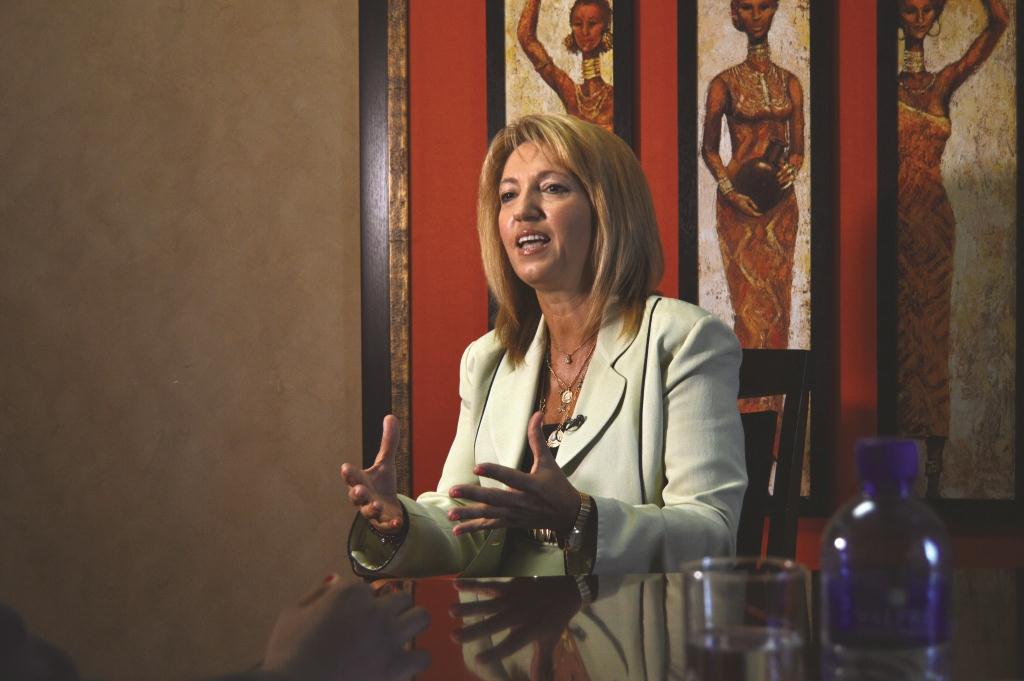Maria Diamantopoulou, who has the distinction of being Greece’s first female ambassador in South Africa, is dressed in a pale lime green suit. It is an apt choice, immediately conjuring up the myriad of blue, teal and turquoise colors of the Mediterranean she is from.
Like the warm hues, her persona too is calm and placid. As Greece’s top-ranking representative to South Africa, she conducts high-level negotiations with the local government, and is responsible for her many countrymen resident in the Rainbow Nation.
We meet her in September, the month her two-year term comes to a close. It’s a crucial time to ask her some key questions pertaining to her stint, and her country’s recent economic crisis. She talks about how her Africa job was fulfilling in every way.
“I love this job because not every day is the same. I never know what to expect and it is always fun to meet people and engage on life-changing issues,” says Diamantopoulou.
And of course she is no stranger to random, or pointed, questions on the Greek financial crisis.
Loading...
“The Greek people suffered for a long time,” she says painfully.
“Greece lost 25 percent of its GDP in such a short space of time.”
Diamantopoulou says most of the money in the new bailout package will be used to repay existing debt rather than rebuild the shattered Greek economy.
“Other countries in Africa can learn from this crisis to avoid similar problems. Countries should learn that challenges are the same around the world. I can see the first signs of [trouble, for example] unemployment in South Africa which is a very important issue. I always tell my South African friends and counterparts to try and learn from what we suffered,” she says.
Diamantopoulou encourages African countries to implement measures while there is still time to ensure the same crisis does not befall them.
“The public sector and bureaucracy are two of the main issues that any economy should focus on to improve and try to shrink so that there is more room for investment, growth of the private sector and small to medium businesses which are very important,” she says.
It has been a tough job at the helm.
“It is not easy being in such a position be it as a man or a woman because you have to prove who you are and what you can do,” she says.
Her main concern is the development of tourism, which contributes more than 15% of Greece’s annual Gross Domestic Product. She says tourism continues to grow despite the issues.
“Tourism is a big part of Greece’s economy just as it’s in South Africa and other countries on the continent. In Greece, there were 22 million visitors last year and this year, there has already been 26 million.”
And have South Africa’s own new tourism regulations affected the number of visitors coming from Greece? She says it hasn’t.
“Greeks are adventurous people. They like to travel the world,” she smiles.
Now heading back home, to Athens, Diamantopoulou says she will miss South Africa.
“I love this country and its potential. South Africans are beautiful people who smile all the time and I regret not having had enough time to travel while I was here. I will make sure to come back as a tourist and enjoy this beautiful nation.”
She says she relates to South Africa and always feels at home here because the people from both countries have suffered the effects of colonization.
“South Africans and the Greeks have a special relationship. We know the struggle for democracy and we defend human rights. We suffered the same way which makes me feel at home here,” she says.
For Diamantopoulou, it is good-bye for now but it seems not forever.
Loading...
